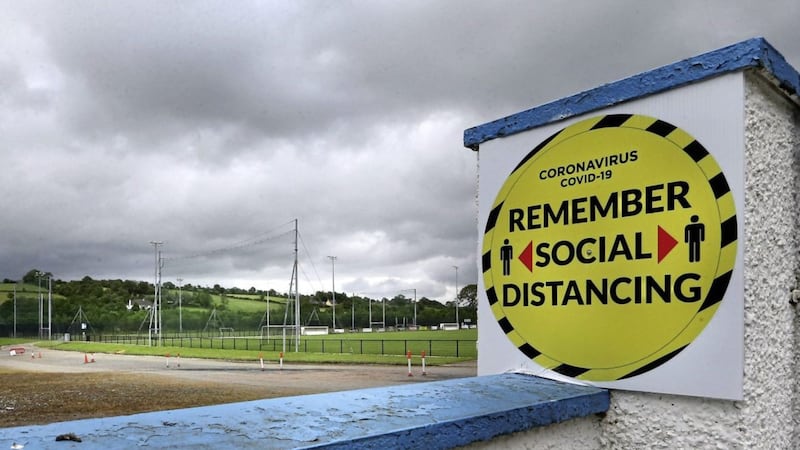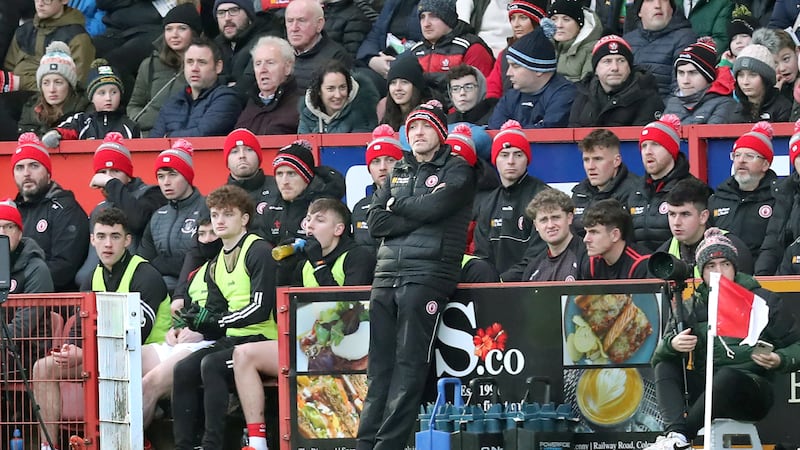SINCE the first lockdown was ended towards the end of June and clubs led the GAA’s tentative steps back out on to grass, some 20,000 football and hurling matches have been played around the country.
It has sustained a nation through the bleakest of summers.
The youth of today are hard enough to convince out to a football field without being told the only thing they’re allowed to do is sit in the house, away from their friends and even family.
The GAA may not be able to financially afford a lost winter championship, but it could even less afford a lost summer among the hearts and minds of the next generation.
Games got up and going, and within days it seemed that all the early fear and uncertainty evaporated like the last spring raindrops.
Summer hit, the pitches were hit, and the freshest of winds blew through the GAA.
Not a sinner at the games, the clubhouses all closed, training restricted, travel restricted.
It has been a long time since it all seemed so pure and natural.
For all the advancements in sports science the last two decades, the spectacle has rarely been better.
Without a crowd, some men have come out of their shells. Fairytales have been written, sent for print and then brought back for a rewrite because of a penalty shootout.
Nothing about the last seven months has made any sense, least of all that it has seemed such an enjoyable period of sport when no-one else was allowed in to enjoy it.
For three-and-a-half months, we got away with it. Every Sunday that the wrists were taped, the boots pulled on and the speeches forgotten through sheer ‘why did we ever make speeches before?’, it felt like it could be the last Sunday.
And that brought such liberation.
It was only in lifting the silverware that communities realised the weight of a county title was much the same as it has been any other year.
Until that point, the journey felt lighter.
And right up until the weekend, the sport largely escaped Covid’s clutches.
The GAA’s Covid advisory group receive daily reports on outbreaks with any relation to them.
To this day, there is still not a single case of transmission recorded as the result of an outdoor gathering at a GAA match.
The restriction on crowds might have had a fair bit to do with that, but the fact that the virus is 16 times less likely to be passed on outdoors has been the primary justification for the decision to return to games.
In the last few weeks, the heat has come on. Scenes of celebration around county finals were hard to prevent but equally hard to explain away to authorities and other sporting bodies who looked on.
Whatever happened in the confines of the pitches, the GAA had a responsibility to manage. And in 99.9 per cent of cases, it did so effectively.
What happened once the trophy left the field was another matter. Celebrations in pubs and houses have been linked to several outbreaks in different areas of the country.
That left the GAA under increasing pressure and with infection rates increasing across the country, they took action yesterday to shut down all club games at all levels for the foreseeable future.
It was a decision made by the management committee partly in the expectation that the Irish government would follow NPHET’s advice of moving to a level five lockdown in the Republic, which would have made cancelling all fixtures mandatory anyway.
At the time of writing, the Dáil was about to debate the move, with suggestions emerging that they would reject it and go to level three, content that enough wind had been put up the country by the fear of a complete lockdown.
Even if that was the case, it seems highly unlikely that the GAA will reverse yesterday’s decision.
Whatever move the government makes, the infection rates tomorrow won’t be any significantly less than they were today.
There is a threat to society and, unfortunately, the GAA has come to inadvertently contribute to that threat through the aftermath of success.
It is far from the only factor, but there’s a good reason why sport has become an easy target.
The absence of supporters on a worldwide basis makes very little sense, other than the argument that keeping people away from games keeps them away from pubs as well.
Sport is good for its own economy. Pubs and hotels and the rest make a bit but for all the money that swirls around in a big bubble, not much of it gets out. So the primary effect of sport closing down is on sport itself.
The GAA is almost completely financially dependent on an inter-county championship happening.
That is why yesterday’s announcement shut down club games but left hopes open for the inter-county series, which is due to begin in nine days’ time.
Yet the north is set to go into its ‘circuit breaker’ lockdown across those first two weeks and possibly into the first weekend of championship. Fans will not be allowed to attend inter-county games.
The suggestion from the GPA is that players want to go ahead with the championship. Whether yesterday has tempered that enthusiasm, it remains to be seen. They will hardly be enthused by the idea of training for the next four weeks to then be told at the last minute that all is cancelled.
Sponsorship and TV rights are worth everything to the GAA now. The government’s €15m rescue package is also ring-fenced to help run the championships and so that money may not be available if it doesn’t happen.
Playing games behind closed doors is still a possibility, and with all avenues of broadcast being explored there will be method of bringing the games into the nation’s living room, but it’s hard to see quite how infection rates will level off between now and November.
There are so many logistical issues around inter-county football, especially in Ulster where the cross-border differences in approach only complicate matters. There are still that the NI executive will keep to the same path as the Republic, thus making it easier for the GAA to operate.
But as today’s Irish News reveals, Fermanagh are the latest county to abandon training, following on from Armagh and Donegal. Derry city, which is due to host Derry’s game with Armagh, is in lockdown.
Infection numbers in Donegal are higher than anywhere else in Ireland, twice as high as in Dublin.
The GAA will make no call on the inter-county championship yet and with the backing of players, they are right not to.
It’s hard to see it happening, sadly, for the winter could do with some of the summer’s magic.







